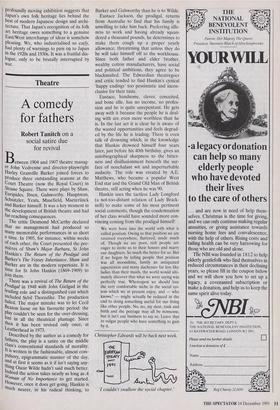Theatre
A comedy for fathers
Robert Tanitch on a social satire due for revival
Between 1904 and 1907 theatre manag- er John Vedrenne" and director-playwright Harley Granville Barker joined forces to produce three outstanding seasons at the Court Theatre (now the Royal Court) in Sloane Square. There were plays by Shaw, Euripides, Ibsen, Galsworthy, Hauptman, Schnitzler, Yeats, Masefield, Maeterlinck and Barker himself. It was a key moment in the development of British theatre and had far-reaching consequences. The critic Desmond McCarthy declared that no management had produced so litany memorable performances in so short a time. In 1905, for instance, within weeks of each other, the Court presented the pre- mieres of Shaw's Major Barbara, St John Hankin's The Return of the Prodigal and Barker's The Voysey Inheritance. Shaw and Barker are in the modern repertoire. It is time for St John Hankin (1869-1909) to Join them.
There was a revival of The Return of the Prodigal in 1948 with John Gielgud in the leading role and a distinguished cast which Included Sybil Thorndike. The production failed. The major mistake was to let Cecil Beaton loose on his favourite period: the play couldn't be seen for the over-dressing, lost in all the theatrical plumage. Since then it has been revived only once, at Leatherhead in 1973.
Described by the author as a comedy for fathers, the play is a satire on the middle class's conventional standards of morality. It is written in the fashionable, almost com- Pulsoiy, epigrammatic manner of the day, and at first it seems as it if isn't saying any- thing Oscar Wilde hadn't said much better. Indeed the action takes nearly as long as A Woman of No Importance to get started. However, once it does get going, Hankin is much nearer, in his radical thinking, to Barker and Galsworthy than he is to Wilde.
Eustace Jackson, the prodigal, returns from Australia to find that his family is unwilling to take him back. Preferring idle- ness to work and having already squan- dered a thousand pounds, he determines to make them cough up a proper yearly allowance, threatening that unless they do he will take himself off to the workhouse. Since both father and elder brother, wealthy cotton manufacturers, have social and political ambitions, they agree to be blackmailed. The Edwardian theatregoer and critic tended to find Hankin's cynical 'happy endings' too pessimistic and incon- clusive for their taste.
Eustace, handsome, clever, conceited, and bone idle, has no income, no profes- sion and he is quite unrepentant. He gets away with it because the people he is deal- ing with are even more worthless than he is. In the last act it is clear he is aware of the wasted opportunities and feels degrad- ed by the life he is leading. There is even talk of drowning which, in the knowledge that Hankin drowned himself four years later, just before his 40th birthday, gives an autobiographical sharpness to the bitter- ness and disillusionment beneath the sur- face of nonchalant wit and imperturbable audacity. The role was created by A.E. Matthews, who became a popular West End star and the Grand Old Man of British theatre, still acting when he was 90.
Hankin uses the tactless Lady Longford (a not-too-distant relation of Lady Brack- nell) to make some of his most pertinent social comments, though the condemnation of her class would have sounded more con- vincing coming from the prodigal himself:
We were born into the world with what is called position. Owing to that position we are received everywhere, flattered, made much of. Though we are poor, rich people are eager to invite us to their houses and marry our daughters. So much the better for us. But if we began by telling people that position was all moonshine, family an antiquated superstition and many duchesses far less like ladies than their maids, the world would ulti- mately discover that what we were saying was perfectly true. Whereupon we should lose the very comfortable niche in the social sys- tem which we at present enjoy, and — who knows? — might actually be reduced in the end to doing something useful for our living like other people. No, no, my dear, rank and birth and the peerage may all be nonsense, but it isn't our business to say so. Leave that to vulgar people who have something to gain by it.


































































 Previous page
Previous page